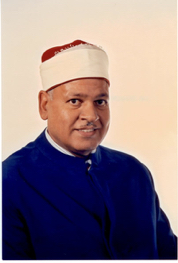

1932-2001
Imam and Director (1982-1998), Islamic Center of Greater Toledo, Ohio, USA

When, in 1998, he announced his retirement, said one of the congregants: “Imam, the person who is going to replace you is not born yet.”

- Recitation of the Holy Qur’an by Imam A. M. Khattab
- His Sermons
- Biography and other information about the Imam
Recitation of the Holy Qur’an by Imam Khattab
While there are many excellent recitations of the Holy Quran in the world this one is truly unique. The tone and inflection of Imam Khattab’s voice changes constantly with the meanings and the message of the versus. There is no monotony of voice or cadence. There are fast suras and there are slow suras. Check it for yourself. The following are some samples:
Listen to verses 18:18-31 (18:18-22, 18:23-31) and notice the abrupt change in cadence at the end of verse 22. Hear the tenderness in the voice of God as he addresses the Prophet directly.
Listen to the story of Noah in Chapter Hud verses 36-49.
Sura Al-Mursaalat #77 (1-40, 41-50) consists of just 40 short verses. You can hear the staccato beat of the irresistible onward march of Man towards the Resurrection. The refrain “Ah, woe that Day to the rejecters of the Truth” is repeated ten times but without monotony; it expresses pity, sympathy or regret; at other times it is just a plain statement. And then, the last verse conveys such intense sadness, with reference to those rejecters of the Truth.
Listen to Sura Nisa 4:1-22 (4:1-10, 4:11-14, 4:15-22) and hear the softness and tenderness in Imam Khattab’s voice.
Listen to the intensity of Moses’ prayer as he sits under the tree after watering the animals, lonely, desperate, hungry, and homeless 28:24 (22-28).
Listen to 3:190-200.
The Sermons of Imam Khattab
There are a total of 44 topics. The information is practical; the bare facts are presented after sifting through the volumes of Fiqh, and, most of all he was so gracious by allowing us to follow whichever school of thought made sense to each one of us. He stressed the importance of using one’s brain to arrive at a sincere and logical conclusion even if you risked reaching the wrong conclusion, rather than blindly following any imam’s fatwa.